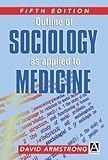Outline of sociology as applied to medicine / David Armstrong.
Material type: TextPublication details: London : Arnold, c2003.Edition: 5th edDescription: [ix], 166 p. ; 24 cmISBN:
TextPublication details: London : Arnold, c2003.Edition: 5th edDescription: [ix], 166 p. ; 24 cmISBN: - 9780340809204 (pbk.) :
- 0340809205
- 362.1042 ARM
- RA418
| Item type | Current library | Call number | Copy number | Status | Date due | Barcode | |
|---|---|---|---|---|---|---|---|
| Long Loan | TUS: Midlands, Main Library Athlone Nursing Collection | 362.1042 ARM (Browse shelf(Opens below)) | 1 | Available | 125126 | ||
| Long Loan | TUS: Midlands, Main Library Athlone General Lending | 362.1042 ARM (Browse shelf(Opens below)) | 1 | Available | 125125 |
Previous ed.: Oxford: Butterworth-Heinemann, 1994.
Includes bibliographical references (p. 147-156) and index.
1. Introduction-- Scope of the book --2. Going to the doctor--The experience of symptoms-- Illness behaviour--Importance of illness behaviour for the doctor--Illness behaviour and the medical model--3. Measuring health and illness --Mortality --Morbidity prevalence studies--Sickness absence rates-- Caseload --Measures of functioning --Self-report measures --Subjective health measures--Quality of life measures --Health and expectations--Measuring health --4. Social causes of illness--Causal models--Establishing a causal relationship-- Social factors: indirect effects --Social factors: direct effects --Social integration --Social support-- Social capital --Life events--5. Labelling behaviour--Primary deviance --Secondary deviance --Stigma --Disablement-- Labelling and psychiatric disease --6. Social patterns of illness:1. Explaining illness patterns-- Historical changes --Geography --Occupation --Gender-- Ethnicity--Unemployment--7. Social patterns of illness: II -- Age --Social class --The life course--8. Coping with illness-- Managing labels--Coping with chronic illness--Carers and coping--9. Models of illness--Exploring abdominal pain --Symptoms and pathology --Biographical or patient-centred medicine --Surveillance medicine --Alternative models of illness --Models of the doctor--patient relationship--10. Types of health care --Self-care--Family care --The role of carers --Community care--Self-help groups-- Professional care--11. Medicine, the professions and clinical autonomy --Controlling information-- Limiting costs--Economic incentives --Evaluating doctors\' decisions --Clinical governance--12. Organizing health care --Allocating scarce resources --Government intervention in health care-- Managed competition --The internal market--The future of health care --13. Evaluating health care --Is the health care system effective/efficient?--Does the health care system meet the \'real\' needs of its consumers?--Is the allocation of health care fair?--Is health care iatrogenic?--14.The social role of medicine --Defining disease --Normality in medicine --The biological basis of disease --The doctor as agent of social control --Medicine and society.
The fifth edition of this textbook explores the origins, nature and context of illness in society and provides a framework for understanding the relationship between health, health care and the society in which it occurs.
